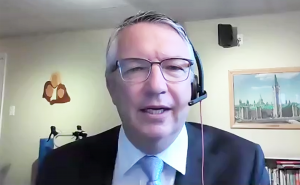OTTAWA – One local MP calls it “fiscal fantasy,” but Liberal officials say the federal budget unveiled last week includes vital programs to help Canadians, including initiatives to address health/dental care and affordability.
Guelph MP LLoyd Longfield said he is happy to see the budget, introduced on March 28, also includes a plan to offer billions of dollars in tax credits for investments in “clean” electricity and manufacturing over the next decade.
He noted “the Americans and Europeans” are “investing in clean technology,” so the plan will help Canadians stay competitive and “keep the local jobs going.”
Longfield also lauded the government’s commitment to a dental program that is expected to cost about $13 billion over five years.
This year the program will be open to those under the age of 18, seniors and people with disabilities, though they must meet income criteria and be without insurance. The government plans to expand the program to everyone who meets household income requirements (currently set at less than $90,000) by 2025.
“Expanding the dental program is going to have an impact, especially with people struggling with groceries and cost of living,” said Longfield.
He added more help is on the way with the extension of the temporary doubling of the GST rebate for low-income Canadians.
Initially announced last fall, the program will provide up to $234 for a single person, $467 for a couple with two children and $225 for a senior citizen, which the government says will help with inflation, notably the rising cost of groceries.
He noted the GST rebate is “a temporary program” with “targeted support” that the government will “keep reviewing.”
“It’s a balancing act,” to “get money to people who need it to buy the things they need, not other things that would cause inflation to go up,” he added.

GUELPH MP LLOYD LONGFIELD
The Guelph MP noted the budget also includes a number of programs that will help farmers in Wellington County, including $333 million over 10 years for a dairy innovation and investment program.
“We have trade agreements around the world so we have to make sure we are competitive on things like dairy to keep ourselves in the game,” Longfield told the Advertiser.
He noted the budget also includes:
- fertilizer reimbursement, particularly targeting those who were buying fertilizer from Russia;
- funding for a foot-and-mouth disease vaccine bank to “protect our herds”; and
- an increase to the interest-free limit of Advance Payments Program loans.
“There’s a fair amount in the budget around agriculture, which in our area is really good to see, because we rely on our farmers to keep doing what they are doing,” said Longfield.
He added the budget will also continue progress made on affordable housing, including the First Home Savings Account, which was first announced last year and starts this month.
He also touted plans to spend $4 billion over seven years on an urban, rural and northern Indigenous housing strategy starting next year, which was announced in the budget.
Longfield specifically mentioned other budget initiatives, such as:
- a “mortgage code of conduct”;
- lowering of processing fees on premium credit cards;
- increasing grant money going to students; and
- increased RESP (registered education savings plan) withdrawal limits.
Asked about the projected deficit of $43 billion for 2022-23, Longfield said the figure is about 1.5 per cent of Canada’s GDP (gross domestic product) – which is low compared to other G7 nations.
Longfield says the government “still needs to be investing in Canadians to get through the difficult times we are in, not cutting back on programs, particularly ones that are affecting families.”
Chong not impressed
However, Wellington-Halton Hills MP Michael Chong called the budget “fiscal fantasy.”
“There’s gobs of new spending and that runs contrary to what economists are telling us,” Chong said in a phone call from Ottawa on March 31.
“The government should be making efforts to decrease inflation. This new spending will only fuel inflation.”
Chong scoffed at initiatives the Liberal government says will help regular people.
The “grocery rebate” (the government has applied that label to the GST rebate program), which amounts to $467 for a family of four, doesn’t come close to offsetting the increased food costs that family is actually facing, Chong said.
Similarly, the tax-free first-time home buyers savings account, where a maximum $8,000 a year can be squirrelled away to buy a home, scarcely approaches a down-payment, never mind the actual price of homes, he added.
Chong said the price of homes in Centre Wellington – and everywhere across the country – has tripled since the Liberals took office in 2015.
“These are all Band-Aids,” Chong said. “They giveth with one hand and taketh away with two.
“People are struggling, they’re desperate to pay their bills at the end of the month. Instead of reversing their course and showing fiscal restraint, the Liberals have done the opposite.”
Asked if the budget includes any redeemable qualities, Chong was adamant in his response.
“There is nothing in this budget I can support,” he said. “It’s a terrible plan.”
Adds fuel to the fire?
Perth-Wellington MP John Nater agreed with Chong’s assessment.
“The people I talk to are concerned about the rising cost of living. Yet, this budget adds more fuel to the inflationary fire,” Nater stated.
He noted the April 1 increase to the carbon tax will “drive up the cost of groceries and the everyday essentials Canadians need,” and not helping the matter is a 2% increase in the tax on alcoholic beverages.
Nater also bemoaned a lack of help with high-speed internet connections.
“While our local, independent internet service providers are doing the hard work to get Canadians connected, the government is failing to support them,” he stated.
And despite the government’s claims, Nater said the budget “doesn’t address the concerns of farmers and farm families.”
For more details on the budget visit budget.canada.ca/2023.




